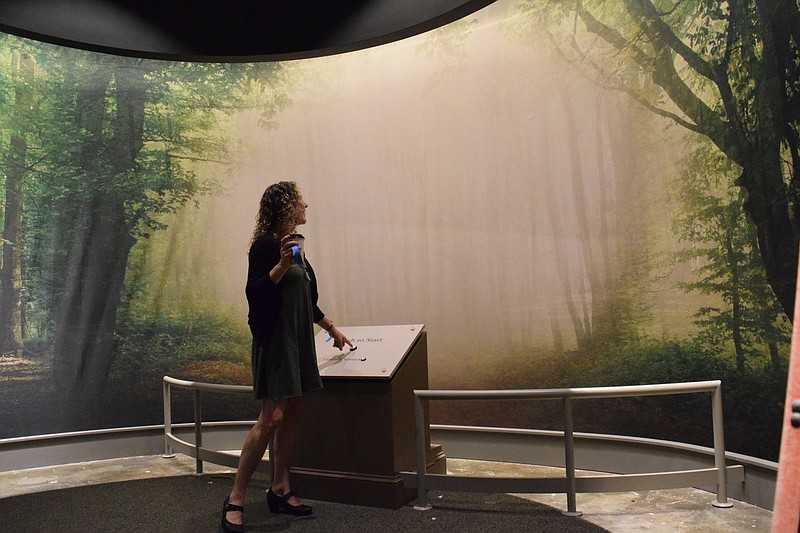Quid pro quo. Ever heard that phrase?
No, this is not about impeachment but about the years-long holdup of passage of a congressional bill that would return 76 acres of land along the Little Tennessee River and Tellico Reservoir in Monroe County, Tennessee, to the Eastern Band of Cherokee Indians.
The Eastern Band of Cherokee Historic Lands Reacquistion Act passed the U.S. House 383-2 in 2018 but was never taken up by the U.S. Senate. Reintroduced in the current session, it passed the House in a voice vote on Dec. 16, 2019. Again, it rests in the hands of the Senate.
Why would such an obviously bipartisan bill get stuck in the Senate? U.S. Rep. Chuck Fleischmann, R-Chattanooga, told the story in a meeting with Times Free Press editors and reporters last week.
The bill had a hold attached to it in 2018 by U.S. Sen. Richard Burr, R-North Carolina, he said. Whether that will happen again this year remains to be seen.
The North Carolina senator apparently wants something for his support. He wants federal recognition for the Lumbee tribe, which would give it the same rights and benefits as members of other federally recognized Indian tribes.
The Cherokee Indians are said to oppose full recognition for the Lumbees. Burr, in a 2019 op-ed in the Charlotte Observer, characterized the Cherokees as greedy and unwilling to share federal benefits with the Lumbees.
Legislation to fully recognize the Lumbees, who were acknowledged as a tribe by the federal government in 1956, is similarly proposed in Congress annually but never succeeds.
Thus, the impasse.
It seems a shame, though, to oppose a bill that would return land to the Cherokees that was originally theirs. The land had been acquired by the federal government for the Tennessee Valley Authority (TVA) in order to build the Tellico Dam across the Little Tennessee River, which became operational in 1979. Though no Cherokee communities were extant when the land was seized, 276 families were displaced. But an agreement at the time said Cherokee land that was once headquarters for the tribe eventually would be returned.
The land in question, according to Times Free Press archives, contains sites that include the Cherokee towns of Tanasi and Chota, two principal towns and de facto capitals of the Overhill Cherokee living in East Tennessee, and the birthplace of Sequoyah, the man who invented the Cherokee's written language and established the first national bilingual newspaper, in Vonore, Tennessee.
The bill, if ever passed by the Senate and signed into law by the president, would make the 76 acres reservation land and would allow the tribe to build facilities for interpretive and educational programs and other types of operations. The land and easements would be placed into a trust for the use and benefit of the tribe, and any subsequent shoreline work would be subject to TVA approval.
Cherokees have opposed recognition of the Lumbees for more than a century, according to Richard Sneed, principal chief of the Eastern Band of the Cherokee Indians, in a different Charlotte Observer op-ed.
He said they have claimed to be a Cherokee tribe and at least three other historic tribes over the years, and have "tried to appropriate our Cherokee culture and identity." He said they support the Lumbees "going through the federal acknowledgement process at the Department of the Interior," as other tribes have, rather than "Burr's bill that would circumvent the federal administrative process."
Fleischmann first introduced legislation concerning the TVA land in 2015 but said the situation has been discussed for the near decade he's been in Congress.
"Who would be against that?" he said. "We even put anti-gaming language in [the bill]. It would be great for Monroe County."
Fleischmann last month said the bill has drawn help from Tennessee Sens. Lamar Alexander and Marsha Blackburn and North Carolina's Thom Tillis, the Tar Heel state's other senator who attended Chattanooga State Community College and later worked for Provident Life and Accident Insurance Co. here.
In an election year, with the impeachment trial of President Donald Trump and current tensions in the Middle East following last week's drone strike on Iranian strongman Qassem Soleimani, the bill's prospects in the Senate are unknown. But we hope Burr, who is retiring from the Senate next January, won't delay the bill.
The dispute between the Cherokees and the Lumbees may have points on both sides, but it shouldn't delay legislation that only seeks to return to the Cherokees what was theirs and what was promised would be theirs again.
"[The previous holdup] was punitive," said Fleischmann. The promise was "left unfulfilled."
By this time next year, we hope it won't be.
